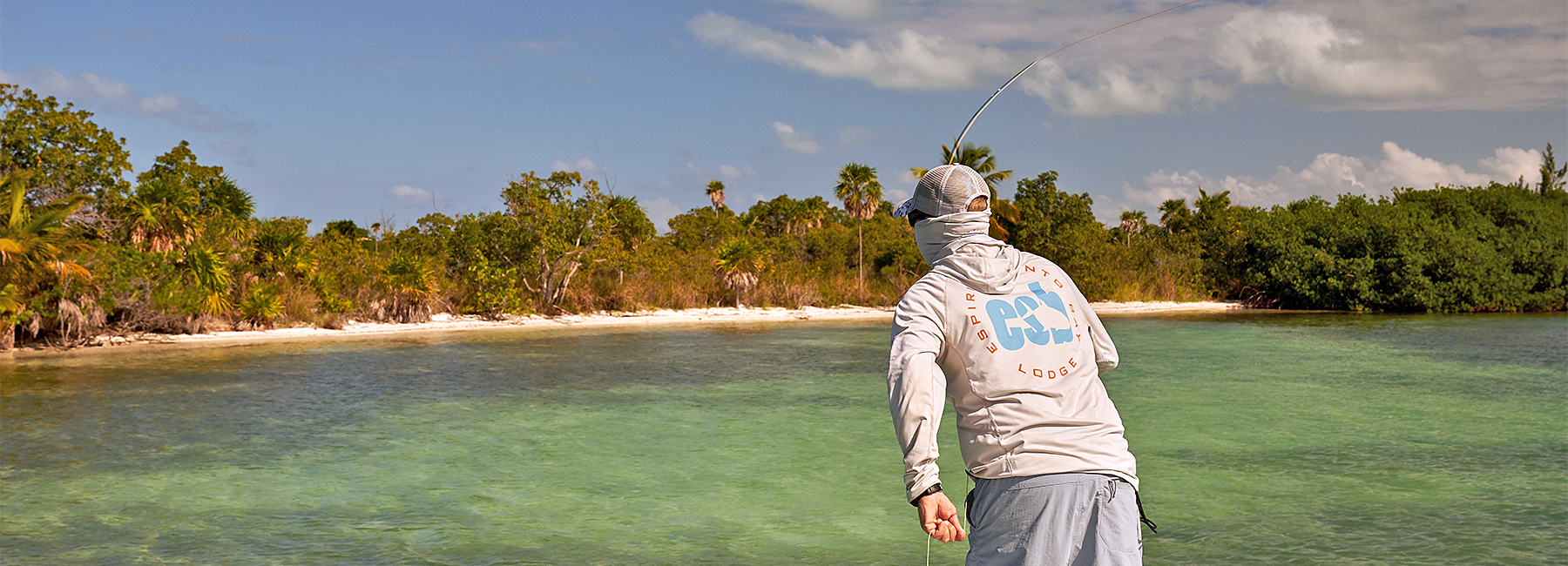Fishing Report #31
September 22 – 29, 2024
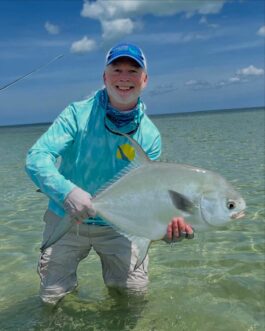
Welcome to the Caribbean
On the vast shores of the peninsula, where the sky seems endless and the wind carries the voices of the ancestors, the Maya told a story about the weather, its vagaries and the art of adaptation.
Chac, the rain god, was known for his unpredictable temperament. Sometimes he would pour torrents of water over the land, drowning it in mud and chaos. At other times, he withheld the rains for months, drying up the rivers and withering the fields. At his side, Huracán, God of storms, blew with uncontrollable fury, unleashing winds that tore the huts up by the roots, while men and women ran for refuge in the bowels of the jungle.
Every year, the farmers asked for the blessings of the gods, hoping that they would be generous, but they knew that the weather was an indomitable adversary. There was no prediction possible. It was impossible to know if the harvest would be abundant or if the gods, in their eternal game, would turn their work into sand.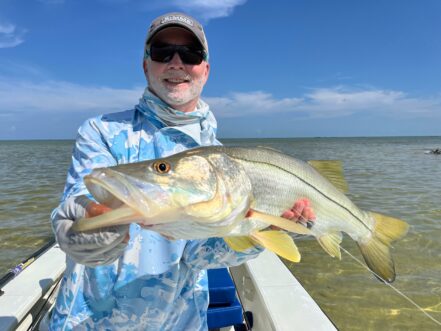
However, among them lived Ixchel, an old woman who had spent her whole life observing the skies and listening to the winds. She feared neither Chac nor Huracán, for she had learned that to resist the weather was to lose the battle before it began. “The gods neither punish nor reward,” he used to say. “They just are what they are. Whoever understands this does not need to fight them, only learn to move with their rhythm.”
While others prayed, she planted in the short rainy season, stored water in droughts and built huts that could withstand the onslaught of storms. Not because she wanted to control the weather, but because she had learned to observe, adapt and flow with the whims of the sky.
Once, in the midst of a great storm unleashed by Chac, Huracán blew so hard that the villagers ran for shelter, fearful that their homes would crumble. Ixchel, however, remained serene. “The wind only destroys what faces it,” she murmured. And so, it did. Those who had rigidly built their homes saw their roofs blow off and their walls fall, while Ixchel’s flexible hut, built to yield to the wind, remained standing, bowing but never breaking.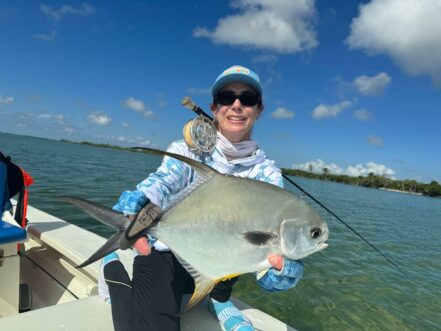
The next day, as the sun peeked through the clouds, the villagers gathered around the old woman. She looked at them with a calm smile. “You cannot predict the weather,” she told them, but you can learn to live with it”. There is no greater victory than adapting to what you cannot control.”
And so, Ixchel’s lesson was passed down from generation to generation, as a reminder that, though the weather and the gods were unpredictable, adaptability was the key to surviving and thriving in a world where nothing was guaranteed.
The gods would continue with their whims, but those who, like Ixchel, understood the power of flexibility, would find prosperity in chaos. Ixchel’s lessons are remembered today more than ever, not only because of the storms and hurricanes that characterize the Caribbean, but because they apply to all of life’s experiences and situations, and fishing is no exception.
FISHING
Since its arrival, we were all aware of a tropical disturbance that was upon us, and we followed its development attentively. Its slow but steady movements kept us right on the edge of its area of influence, which meant that on Monday we had light winds and scattered clouds moving in no predictable direction.
Catherine and David were the first to break the ice and added the first permits to the week’s score. Jim added one more and the menu of catches was completed with bonefish, snapper, blue runners; the tarpon seemed to have taken the day off and didn’t show up in the bay, while the snooks did show up, but were totally immune to the lures our anglers presented them with.
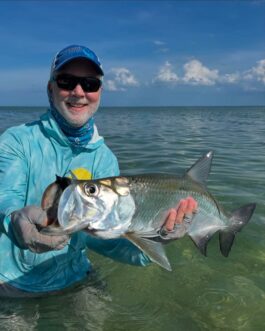
In the early hours of Tuesday, the tropical disturbance became a tropical storm and, although it did not affect us directly, it kept us under the area of influence of the large air masses it moved. This brought us winds from the north that were rotating to different directions during the day and some sporadic rains. In spite of these unfavorable weather conditions, the tarpon, bonefish and snook were in charge of livening up the fishing day. As for the permit, although some schools were seen, the movement of this species in the bay was much lower than usual.
On Wednesday, the tropical storm had already been christened Helene and continued to move northward, with a slight curvature that brought it a little closer to us, but still kept us on the edge of its zone of influence. This brought us westerly winds, very unusual for this area, intermittent showers and very cloudy skies.
The westerly winds caused the shallow waters of the bay to become murky and the underwater inhabitants were rarely seen, despite the tireless efforts of our fishermen and guides to find them. Bonefish, snapper and a few barracuda saved the day and gave our anglers a dose of adrenaline.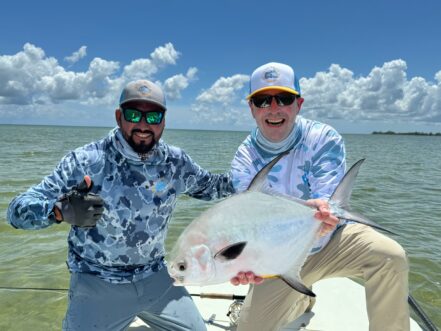
On Thursday, Helene moved with more speed towards the north, passing between the Yucatan Peninsula and Cuba, to enter the gulf and become a hurricane. This shift favored us with clearer skies, brighter sunshine, and strong tides helped the murky waters return to their usual clarity quickly. Still, winds continued out of the west with some variations to the north throughout the day. Johnson didn’t let the opportunity pass him by and closed his day with a fantastic Super Grand Slam; his patience and adaptability finally paid off.
Friday was sunny and with light winds blowing according to the designs of a roulette wheel: sometimes from the west, then south, east, north, returning to the west, absolutely unpredictable. Faced with this unstable situation, again the inhabitants of the bay, perhaps confused, let themselves be seen little.
With the arrival of the last day’s fishing and Helene now well away, everything seemed to be slowly returning to normal weather-wise. Catherine and David added a few more permit to the score, Jim did the same, and the shooting chances came and went for everyone, but permits don’t give up easily, as we all know.
WEATHER
Winds remained mostly light to moderate all week, between 7 and 15 mph, with directions rotating through each and every cardinal point. Rains were not a big problem this week, but were present for short periods in some sectors of the bay and the lodge.
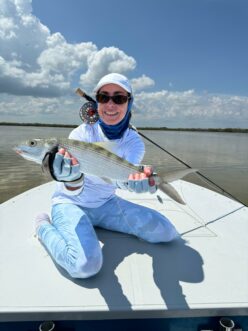
FLIES
There was no marked pattern in terms of the flies preferred by permit. They were tempted with the classic Flexo, ESB spawning shrimp, Casa Blanca, ESB Yellow Eyes Raghead Crab, Tequila twister.
Tarpon and Snook always welcome EP imitations, especially in white and chartreuse, as well as black and purple.
The bonefish, always predictable, did not skimp on shrimp or crabs well presented in front of them, in the usual sizes.
We look forward to seeing you next week with a new report and the adventures of our next seven guests, because, as my grandfather used to say, “fishing is not just catching fish”.
See you next week with a new report and do not hesitate to contact our friends at The Fly Shop® so they can tell you first-hand what life is like in Espiritu Santo Bay, the Sian Ka’an Biosphere Reserve (which means “Where the sky begins”, in the Mayan language).
Taak ulak k’iin and Ka xi’ik teech utsil
(See you later and good luck! in Mayan language)
Martin Ferreyra Gonzalez and the entire ESB Family
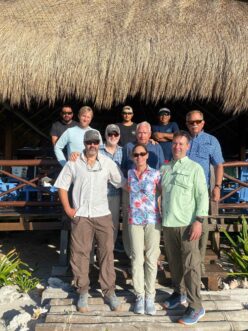
800-669-3474 | 530-222-3555 | travel@theflyshop.com | ESB Lodge


